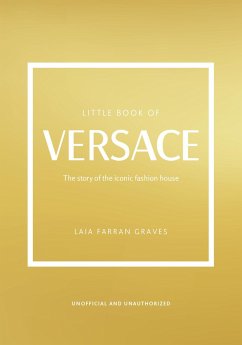
The Brand and Its History
Trademarks, Branding and National Identity
Herausgegeben: Sáiz, Patricio; Castro, Rafael
Versandkostenfrei!
Versandfertig in 6-10 Tagen
154,99 €
inkl. MwSt.

PAYBACK Punkte
77 °P sammeln!
This book delves into the origins and evolution of trademark and branding practices in a wide range of geographical areas and periods, providing key knowledge for academics, professionals, and general audiences on the complex world of brands.The volume compiles the work of twenty-five prominent worldwide scholars studying the origins and evolution of trademarks and branding practices from medieval times to present days and from distinct European countries to the USA, New Zealand, Canada, Latin America, and the Soviet Union. The first part of the book provides new insights on pre-modern craft m...
This book delves into the origins and evolution of trademark and branding practices in a wide range of geographical areas and periods, providing key knowledge for academics, professionals, and general audiences on the complex world of brands.
The volume compiles the work of twenty-five prominent worldwide scholars studying the origins and evolution of trademarks and branding practices from medieval times to present days and from distinct European countries to the USA, New Zealand, Canada, Latin America, and the Soviet Union. The first part of the book provides new insights on pre-modern craft marks, on the emergence of trademark legal regimes during the nineteenth century, and on the evolution of trademark and business strategies in distinct regions, sectors, and contexts. As industrialisation and globalisation spread during the twentieth century, trademarking led to modern branding and international marketing, a process driven by new economic, but also cultural factors. The second part of the book explores the cultural side of the brand and offers challenging studies on how luxury, fashion, culture associations, and the consolidation of national identities played a key role in nowadays branding.
This edited volume will not only be of great value to scholars, students and policymakers interested in trademark/branding research, but to marketing and legal practitioners as well, aiming to delve into the origins of modern brand strategies.
The chapters in this book were originally published as two special issues of the journal, Business History.
The volume compiles the work of twenty-five prominent worldwide scholars studying the origins and evolution of trademarks and branding practices from medieval times to present days and from distinct European countries to the USA, New Zealand, Canada, Latin America, and the Soviet Union. The first part of the book provides new insights on pre-modern craft marks, on the emergence of trademark legal regimes during the nineteenth century, and on the evolution of trademark and business strategies in distinct regions, sectors, and contexts. As industrialisation and globalisation spread during the twentieth century, trademarking led to modern branding and international marketing, a process driven by new economic, but also cultural factors. The second part of the book explores the cultural side of the brand and offers challenging studies on how luxury, fashion, culture associations, and the consolidation of national identities played a key role in nowadays branding.
This edited volume will not only be of great value to scholars, students and policymakers interested in trademark/branding research, but to marketing and legal practitioners as well, aiming to delve into the origins of modern brand strategies.
The chapters in this book were originally published as two special issues of the journal, Business History.














